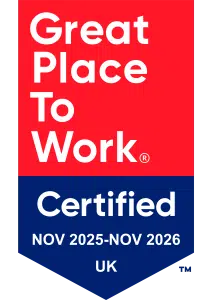Employee experience: what is it and why does it matter?

What is employee experience?
We could try to pin employee experience down as a checklist – workplace perks, fair pay, career development – but that misses the point. It’s broader than that.
Think of it as the sum total of everything an employee perceives and feels throughout their time with a company. It’s how they interpret their physical environment, the digital platforms they work on, the behaviour of managers and the unwritten rules that shape daily interactions.
There’s a tendency to equate employee experience with engagement programmes or perks like free coffee and casual Fridays. But those are only fragments. The real question is: does the company create the conditions for its people to do meaningful work, feel valued and grow? Not only is that the core of a positive experience, but it’s what directly impacts performance and loyalty.
Why does employee experience matter?
The evidence is impossible to ignore. Companies with a strong employee experience outperform those that treat it as an afterthought. It’s linked to higher engagement, and it affects retention rates, productivity and even customer satisfaction. When employees feel connected and supported, they put in discretionary effort – going beyond the bare minimum. And that’s where business growth takes shape.
The financial argument is also clear: a positive experience reduces turnover costs, minimises absenteeism and strengthens brand reputation. Maybe that’s why leaders are starting to see employee experience as a critical driver of value rather than a “nice-to-have” HR concept. It’s no coincidence that discussions about the ROI of employee experience investments are becoming far more common at board level.
But here’s the catch: employee experience isn’t something you can fake. You can’t plaster over weak leadership or toxic culture with superficial perks. People know when they’re genuinely respected, and when they’re just being managed like a line on a spreadsheet.
What shapes a great employee experience?
There’s no single blueprint that works for every organisation. Still, certain themes appear again and again. When employees describe the ideal workplace, they value:
- A sense of purpose – understanding how their role contributes to something bigger
- Autonomy and trust – the freedom to make decisions without being micromanaged
- Tools and resources that make work easier, not harder
- Clear growth opportunities and learning paths
- Fair treatment, transparency and genuine inclusion.
These aren’t “soft” factors; they directly influence performance. Not only are these elements the foundation of a strong employee experience, but they also create resilience when challenges hit – whether that’s organisational change or external market shocks.
How to improve employee experience
It doesn’t happen overnight. Creating your ideal employee experience requires deliberate and consistent action, starting with listening. Gathering feedback – real, unfiltered opinions – matters far more than leadership guesswork. But feedback is useless if you don’t act on it. Employees need to see visible changes or, at the very least, hear why certain changes can’t happen yet.
Technology plays a role, too. A clunky system can ruin a perfectly good workflow, while intuitive tools remove friction and give people more time to focus on work that matters. But technology alone won’t save a poor culture. You need to align leadership behaviour, policies and everyday practices with the company’s stated values.
And to be clear, the organisations that get this right don’t treat employee experience as a “project” with a start and end date. They see it as a continuous loop of listening, learning and adapting.
Connecting employee experience and business success
There’s a direct line between employee experience and business outcomes, but it’s not always immediately visible. That’s why it’s often overlooked. Yet the companies who prioritise initiatives that shape meaningful work tend to see a ripple effect: higher engagement, better collaboration, improved customer satisfaction and ultimately, stronger financial results.
We could assume this is all just about morale, but it’s not that simple. Positive employee experience creates an environment where people feel safe to share ideas, challenge outdated processes and innovate. In other words, it drives competitive advantage in ways that traditional cost-cutting never can.
The bottom line
Employee experience isn’t a side project; it’s central to how organisations attract, retain and motivate their people. It impacts engagement and retention, and influences the quality of customer interactions and an organisation’s ability to adapt in a changing world.
The companies that thrive over the next decade won’t be the ones with the flashiest perks. They’ll be the ones that understand what truly matters to employees – clarity, purpose, respect – and build an experience that reflects it.
